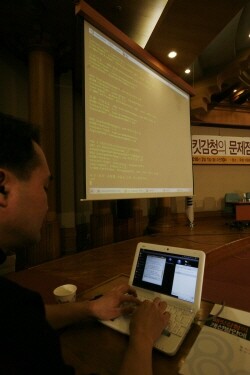hankyoreh
Links to other country sites 다른 나라 사이트 링크
Discussion participants call for an absolute ban on packet eavesdropping

On Feb. 1 in the National Assembly’s discussion room, a computer screen displayed a dialogue between two Internet users who engaged in a conversation using different computers through MSN messenger. Participants in the discussion over packet eavesdropping were easily able to read the dialogue by connecting to the Internet users’ Internet line through a program called ‘Wire Shark.’ The discussion participants were also able to view the contents of e-mails sent through Internet portals such as Daum and Naver. The screen also displayed the revealed passwords as well as user IDs.
The discussion hosted by the main opposition Democratic Party (DP) pointed out the problems behind packet eavesdropping and suggested that it be banned. The discussion was held to seek a legal response to the issue, since people’s concern over packet eavesdropping has increased following the reports that the National Intelligence Service (NIS) and Defense Ministry’s intelligence agency have recently tripled the number of devices and equipment that can be used for packet eavesdropping.
The participants, including DP lawmakers, reacted negatively to the idea of permitting limited packet eavesdropping by saying, “It is impossible to tap only specific contents belonging to Internet users due to the nature of packet eavesdropping.” DP Lawmaker Park Young-sun said, “In this situation, when we attempt to restrict something that is impossible to be restricted technologically, it results in allowing packet eavesdropping in fact.”
Oh Dong-suk, law professor of Ajou University, said, “Packet eavesdropping should not be permitted until we have developed technology that can distinguish between the target and unrelated contents.” Oh continued, “Packet eavesdropping violates Constitutionally-guaranteed individual rights.” Thus, he suggested, “Packet eavesdropping should be completely prohibited.”
Please direct questions or comments to [englishhani@hani.co.kr]
Editorial・opinion
![[Column] Season 2 of special prosecutor probe may be coming to Korea soon [Column] Season 2 of special prosecutor probe may be coming to Korea soon](https://flexible.img.hani.co.kr/flexible/normal/500/300/imgdb/original/2024/0426/3317141030699447.jpg) [Column] Season 2 of special prosecutor probe may be coming to Korea soon
[Column] Season 2 of special prosecutor probe may be coming to Korea soon![[Column] Park Geun-hye déjà vu in Yoon Suk-yeol [Column] Park Geun-hye déjà vu in Yoon Suk-yeol](https://flexible.img.hani.co.kr/flexible/normal/500/300/imgdb/original/2024/0424/651713945113788.jpg) [Column] Park Geun-hye déjà vu in Yoon Suk-yeol
[Column] Park Geun-hye déjà vu in Yoon Suk-yeol- [Editorial] New weight of N. Korea’s nuclear threats makes dialogue all the more urgent
- [Guest essay] The real reason Korea’s new right wants to dub Rhee a founding father
- [Column] ‘Choson’: Is it time we start referring to N. Korea in its own terms?
- [Editorial] Japan’s rewriting of history with Korea has gone too far
- [Column] The president’s questionable capacity for dialogue
- [Column] Are chaebol firms just pizza pies for families to divvy up as they please?
- [Column] Has Korea, too, crossed the Rubicon on China?
- [Correspondent’s column] In Japan’s alliance with US, echoes of its past alliances with UK
Most viewed articles
- 1‘We must say no’: Seoul defense chief on Korean, USFK involvement in hypothetical Taiwan crisis
- 2N. Korean delegation’s trip to Iran shows how Pyongyang is leveraging ties with Moscow
- 3‘Weddingflation’ breaks the bank for Korean couples-to-be
- 4Korea sees more deaths than births for 52nd consecutive month in February
- 5[Editorial] New weight of N. Korea’s nuclear threats makes dialogue all the more urgent
- 6[Column] Has Korea, too, crossed the Rubicon on China?
- 7[Column] Park Geun-hye déjà vu in Yoon Suk-yeol
- 8[Guest essay] The real reason Korea’s new right wants to dub Rhee a founding father
- 9Amnesty notes ‘erosion’ of freedom of expression in Korea in annual human rights report
- 10[Reportage] On US campuses, student risk arrest as they call for divestment from Israel